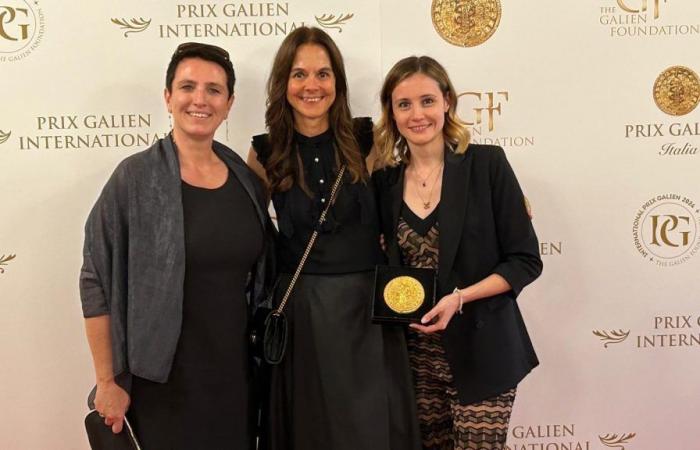
AGIPRESS – Monza 21 June – Glofitamab, Roche’s first fixed duration bispecific antibody approved by AIFA for relapsed or refractory diffuse large B-cell lymphoma after two or more lines of systemic therapy, wins the Prix Galien 2024. For Roche, this is the sixth victory in 10 years of the prestigious Award, considered on a par with a “Nobel” in the drugs and medical devices sector, winning recognition in the “Biological Drugs” category. “It gives us great pride to receive the Prix Galien today for the biological medicines category. Glofitamab represents a significant milestone in the fight against diffuse large B-cell lymphoma (DLBCL), one of the most common hematological cancers – says Anna Maria Porrini, Medical Department Head – The awarding of the award is further recognition of Roche’s innovation which has contributed, in over 125 years, to the progress of medicine thanks to cutting-edge therapeutic solutions”. Glofitamab is a new type of immunotherapy: it is the only CD20xCD3 bispecific antibody existing to date with a 2:1 configuration which allows it to have a region that binds CD3 and two regions that bind CD20 creating an immunological synapse between the T lymphocyte And
the malignant B cell. The monotherapy administration and the fixed duration, combined with high percentages of complete and long-lasting responses even after the end of treatment, make glofitamab a valid therapy with significant benefits even in the most compromised patients (complete response percentage equal to 40% with a median duration approximately 27 months). Unlike other therapeutic options that require long preparation and cell manipulation times before starting treatment, glofitamab represents a ready-to-use solution with no delays for patients in starting therapy. Added to the news of the Prix Galien victory is the news of the important data just presented at the European Hematology Association (EHA) Congress in Madrid. In fact, the results of the Phase III STARGLO study have been announced relating to the combination of glofitamab plus gemcitabine and oxaliplatin (GemOx) compared to the combination of rituximab and GemOX, in patients with relapsed or refractory (R/R) diffuse large B-cell lymphoma (DLBCL). , with at least one previous line
therapeutic and not candidates for autologous stem cell transplantation, or with two or more previous lines of therapy. The primary analysis confirmed the achievement of the study’s primary overall survival (OS) endpoint, demonstrating significantly longer survival of patients treated with glofitamab and GemOX, as well as a 41% reduction in the risk of death (hazard ratio [HR]=0.59, 95% CI: 0.40-0.89, p=0.011) compared to rituximab and GemOx. At a median follow-up of 20.7 months, the median overall survival for patients treated with glofitamab-GemOX was 25.5 months, which is almost double that observed for patients treated with rituximab and GemOx, equal to 12.9 months. The safety of the combination with glofitamab was consistent with the known safety profiles of the individual drugs. Glofitamab is therefore the first CD20xCD3 bispecific antibody to have demonstrated a benefit in terms of overall survival in R/R DLBCL, within a randomized Phase III study. These results show the potential of this therapeutic combination to improve survival outcomes in first disease recurrence and beyond. There is also an ongoing clinical development program for Glofitamab, which studies the molecule in combination with other medicines for the treatment of patients with non-Hodgkin lymphomas at
B cells. Glofitamab is also being studied in other aggressive lymphomas, and recently obtained Breakthrough Therapy Designation from the US Food and Drug Administration (FDA) for
treatment of adult patients with relapsed or refractory mantle cell lymphoma (MCL) and at least two prior therapies, based on the results of the Phase I/II study NP30179.
Roche
Founded in 1896 in Basel, Switzerland, as one of the first industrial drug manufacturers, Roche has grown to become the world’s largest biotechnology company, as well as a global leader in in vitro diagnostics. Roche has been developing medicines for patients with malignant and non-malignant haematological diseases for over 20 years, thanks to its deep experience and knowledge in this therapeutic area. Today, we are investing more than ever in our efforts to offer patients innovative treatment options across a broad range of hematologic diseases. Our approved drugs include MabThera/Rituxan (rituximab), Gazyva/Gazyvaro (obinutuzumab), Polivy (polatuzumab vedotin), Venclexta/Venclyxto (venetoclax) – in collaboration with AbbVie – Hemlibra (emicizumab) and Lunsumio (mosunetuzumab). Our pipeline of investigational hematology drugs includes: the bispecific T cell-activating antibodies glofitamab – which targets both CD20 and CD3 – and cevostamab, which targets both FcRH5 and CD3; Tecentriq (atezolizumab), a monoclonal antibody designed to bind to PD-L1; and crovalimab, an anti-C5 antibody engineered to optimize complement inhibition. Furthermore, our scientific expertise, combined with the breadth of our portfolio and pipeline, provides a unique opportunity to develop combination regimens that aim to further improve patients’ lives. Agipress





